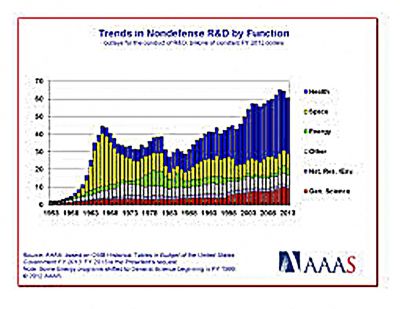
US Science Changes How It’s Funded
Government money paid to universities to conduct basic scientific research characterized the 20th century way of funding US science. That science set much of the world’s science agenda. Not necessarily so in the 21st century, as the US government and most state governments scrounge desperately for revenue. http://en.wikipedia.org/wiki/Science_policy_of_the_United_States
Perhaps government funding will increase in coming years if the US economy recovers from The Great Recession of 2008-2009, but today in 2014 the brightest funding source coming toward America appears to be private money from rich Americans. http://www.nytimes.com/2014/03/16/science/billionaires-with-big-ideas-are-privatizing-american-science.html?ref=science
Analysts at HFS note that at this moment, the US budget for all research & development through universities and government agencies totals about $140 B. So private funding of R&D, as of yet not calculated in any form that can be reasonably compared with the US federal budget for 2014, will not reach that level. Nonetheless, as discretionary funds decline for the US government, watching how R&D survives may prove exciting.
Private funding of basic science combines a focus derived from personal crises of philanthropists with the drive, persistence, and tenacity of successful business owners unmatched by historic government agencies driven under political agendas. The New York Times article cited above lists a few dozen philanthropists by name, but in coming years, perhaps the list will cover many of the additions to a list of new ideas that will change the world. Yet, as the Chinese economy grows in prosperity and world influence, their science agenda will certainly reflect different priorities than either private or government budgets in the US.
What do you think?

140 billion is how much of the GNP? (not that that percentage would be better or worse than the percentage here).
The problem I see with private funding is that basic/fundamental research and may be unpopular research might not get enough funds to survive.
I think you know why they claim for almost every new pharmaceutical ingredient that it “may cure cancer”? They get money for “cancer” but not for (insert some obscure disease name here that only 10000 people have) …
Nuclear physicists are better of in that regard – everyone knows that it is [b]expensive[/b] but that it might solve the energy crisis that we have and allow for travel to the next solar system at some time (exaggerated) – and things like the Tevatron or the LHC look cool and [i]very[/i] futuristic on photos ->
http://www.weltmaschine.de/sites/site_weltmaschine/content/e161/e163/e678/0511013_01-A4-at-144-dpi.jpg
I have to agree QuHno.
Private funding is subject to all the biases and prejudices of the donor(s). What happens when research proves a hypothesis wrong? Does it get published? or do the vested interests just shut it down?